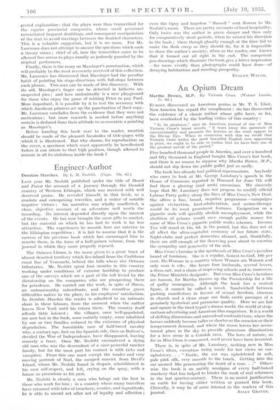Engineer-Author
Desolate Marches. By L. M. Nesbitt. (Cape. 10s. 6d.) LAST year Mr. Nesbitt published under the title of Desert and Forest the account of a journey through the Danakil country of Western Ethiopia, which was received with well deserved praise. He revealed himself, in that book, as a resolute and enterprising traveller, and a writer of notable negative virtues ; his narrative was .wholly unaffected, a clear, objective account of an adventure , well worth the 'recording. Its interest. depended directly upon the interest of the events. He has now brought the same gifts to market, but the material on which he has had to work is far less attractive. The experiences he records here arc anterior to the Ethiopian expedition ; it is fair to assume that it is the success of his previous hook which has encouraged him to rewrite them, in the form of a half-guinea volume, from the journal in which they more properly reposed.
The Orinoco Llanos, is the name given to a great tract of almost deserted territory which lies inland from the Caribbean :coast line of Venezuela, behind the hills where rise Orinoco tributaries. Mr. Nesbitt spent four months in this country working under conditions of extreme hardship to produce one of the surveys which are a part of the toll leVied by the ]dictatorship on the companies who are prospecting there for petroleum. He carried out the work, in spite of illness, an untrustworthy subordinate, and. the countless . grave difficulties native to the place, to his employers' • satisfaction. In Desolate Marches the reader is admitted to an intimate share in these labours, from the moment when the author leaves New York until his return there. The country itself affords little interest ; the villages, once well-populated, are now lost in the bush, some entirely empty, some inhabited by one or two families reduced to the extremes of physical degradation. The formidable race. of half-breed cavalry who, a century ago, first on the Spanish side, then on Bolivar's, decided the War of Independence, have disappeared, leaving scarcely a trace. Once Mr. Nesbitt encountered a dying old man who was the descendant of a once-powerful rancher family, but for the most part his contact is with ticks and vampires. From this one must except the tender and very moving portrait of Noel, the escaped convict from Devil's Island, whom Mr. Nesbitt found in despair, rehabilitated in his own self-respect, and left, crying on the quay, with a future as precarious as his past.
Mr. Nesbitt is clearly a man who brings out the best in those who work for him ; in a country where Many travellers have returned with tales of treachery, avarice, and ingratitude, he is able to record act after act of loyalty and affection ; even the tipsy and hopeless " Russell " sent flowers to Mr. Nesbitt's room. There are pretty accounts of local hospitality. Only twice was the author in grave danger and then only for comparatively short periods, when he missed his direction in the bush ; these though ghastly enough at the time fail to make the flesh creep as they should do, for it is impossible to share the author's anxiety, when as the reader, one knows that it turned out all right in the end. The competent pen-drawings which illustrate the book give a bitter impression —far more vividly than photographs could have done—of decaying habitations and receding prosperity.
EVELYN WAUGH.


























































 Previous page
Previous page